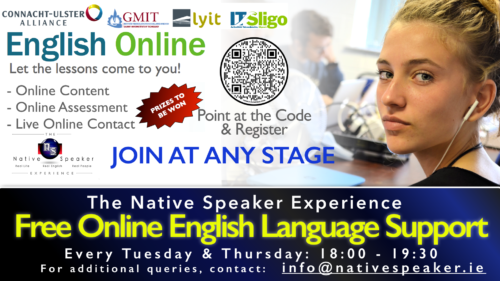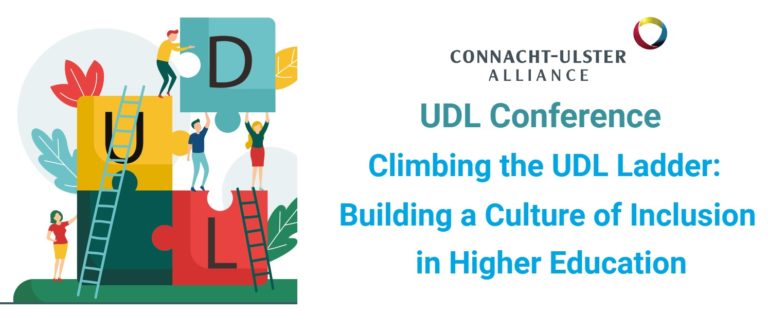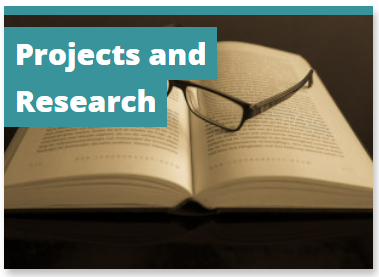Home » Administration » Academic Affairs and Registrar » Teaching and Learning Centre (Sligo) » Projects and Research
Projects & Research
We are currently running a number of exciting projects including HEA Path 4, SATLE Projects, Online International Learning & Online English Learning programme to Universal Design for Learning, Building a Culture of Inclusion in Higher Education
HEA Path 4 Funding Call 2022
The recent criteria for the newly released National Access Plan, particularly under the PATH 4 phase I stream, called for all HEIs to address Universal Design/ Universal Design for Learning within their HEA funding applications.
Ahead of the preparation for individual institution funding application responses to the HEA which were submitted on the 14th of October, AHEAD in collaboration with the IUA and THEA, reached out to all HEIs to initiate a collected response in applications through joined up thinking to respond to the needs of the students of Ireland.
Working through the summer months on this, there was a large response to this call by AHEAD for a national ‘Think In’ and what had been formed as a result is 4 work project packages addressing the criteria of PATH 4, Phase I where various institutes committed to being either lead, partners, or collaborators on these national packages.
See the UD for 3″ PATH 4 Charter Information here.
ATU Path 4, Phase 1 funding will deliver on 5 work packages which will individually and collectively achieve the purpose of this funding initiative. Four of the projects are collaborative in nature, to ensure that sustainable outcomes are achieved for the HEI sector. One of the collaborative packages also has an embedded sole ATU initiative, as it is context dependent. A fifth package builds on the extensive work that ATU have engaged in with UDL to date, but expands the UDL outreach to the community, in line with the Universities commitment to engaging in initiatives that support widening access.
PATH 4 will enable ATU build on their accessibility by expanding our efforts in UD/UDL and seeking to further extend access to education for people with intellectual disabilities. Furthermore, as is evidenced in the various work packages associated with this proposal, PATH4 will contribute to ATU addressing various actions and objectives of the Inclusivity goal of the new National Access Plan, such as supporting students from priority groups to access HE; whole institute approaches to Universal Design; increased student diversity; and improved opportunities for people with ID.
Work Packages:
WP 1: A National Charter for Universal Design in Tertiary Education
WP 2: Leadership in Universal Design
WP3: Enhancement of an Inclusive Environment in Higher Education
Project A: Evidence based web accessibility statement
Project B: To implement campus accessibility improvements that demonstrate best practice in Universal Design
Project C: Enhancing best practice and compliance in accessibility by completing an accessibility audit
WP 4: Create a UDL Community of Practice – to enhance UDL developments across ATU and Regionally
WP 5: Blueprint for development of a pilot programme for people with Intellectual Disabilities
While the rise in discourse about universal design and UDL practice in tertiary education has risen markedly in recent years, there is often misconceptions about what universal design is (as distinct from UDL), a lack of national understanding about what areas of further and higher education we can apply UD approaches to, and what that would look like in practice.
This project involves utilizing the UCD Toolkit for Inclusive Higher Education Institutions (under revision in tandem with this project) as the background to this development.
The accompanying Toolkit will support ETBs and HEIs to measure their progress against 4 pillars and create a reflective action plan for future development in this area.
The pillars in the toolkit address teaching & learning, student services, physical- built environment and IT/ Digital accessibility.
The charter/toolkit will also address the systems and policies which underpin these pillars, and the output will clearly demonstrate how the implementation of universal design supports ETBs and higher education institutions to align with other national targets such as those concerning retention and learner success.
Widening the scope from student centred learning, this charter will explore how a universal design approach can help us to support a diverse staff profile to succeed in FET and higher education. It is envisaged that on completion of the project, institutions would be encouraged to formally adopt the charter as something they are working towards, and that organizations like AHEAD could play an important national role in supporting institutions to adopt and work towards it.
The project team also envisages this output being important in the future shaping of institutional policies and practices regarding student success and UDL.
This National Charter group has a lot of interest and input from colleagues across 10 HEIs, AHEAD, THEA and the IUA. An invitation has been extended to the USI to join this collaboration. The following are the agreed outputs of this group within the 1-year timeframe we are given for this work:
- Develop a National Charter for Universal Design in Tertiary Education. -this includes the desire of the group to incorporate FET and look towards a unified tertiary view of UD.
- Develop a Position Paper exploring and featuring recommendations on how this charter may be built systemically into governing and funding mechanisms.
- Design and publish the National Charter.
- Launch the National Charter in conjunction with AHEAD Conference Spring 2024
It is envisaged that on completion of the project, institutions would be encouraged to formally adopt the charter as something they are working towards, and that organisations like AHEAD could play an important national role in supporting institutions to adopt and work towards it. The project team also envisages this output being important in the future shaping of institutional policies regarding student success and UDL.
The accompanying Toolkit will support ETBs and HEIs to measure their progress against the 4 pillars and create a reflective action plan for future development in this area.
This project would like to seek the high-level support of HEI registrars, and hope that your institutions will both contribute to the planned consultations later in the year and consider adopting the Charter and working towards it on its completion.
Below is the current national UD for 3 Charter Team. For further information, please feel free to contact team members:
- Maureen.Haran@nullatu.ie (Lead)
- Niamh.Plunkett@nullatu.ie (Lead),
- aileen.kennedy@nullmtu.ie (Partner),
- margaret.finch@nullmtu.ie (Partner),
- dara.ryder@nullahead.ie (Lead Collaborator)
Name | Institution/ Organisation |
Maureen Haran | ATU |
Niamh Plunkett | ATU |
Aileen Kennedy | MTU |
Margaret Finch | MTU |
Catherine Deegan | TU Dublin |
Sean O’Reilly | THEA |
Declan Reilly | IUA |
Jean Reale | MIC |
Laura Lee | UCC |
Thomas O Shaughnessy | UL |
Neil O’Sullivan | TUD |
Dara Ryder | AHEAD |
Anne O’Connor | DCU |
Elaine Aylward | SETU Waterford Campus |
Olive Byrne | UCC |
Darragh Coakley | MTU |
Sarah Pattinson | MTU |
Denise McMorrow | IADT |
Colin Tierney | ATU |
Declan Treanor | TCD |
Laura Rafferty | MTU |
Ruth Murphy | MTU |
Siobhan Mac Garry | MTU |
Kevin Gillligan | MTU |
James Northridge | UCC |
Gearoid O Suilleabhain | MTU |
erica meslin | AHEAD |
Trevor Boland | DCU |
Lisa Padden | UCD |
Richard Healy | TCD |
Dr Loren Duffy (TCD) | TCD |
Aoife McNicholl | DCU |
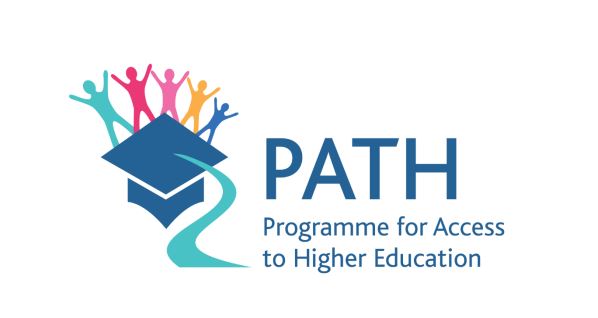
Collaborative Online International Learning Project
ATU Sligo & Georgina College, Canada
Project Title: IT Sligo BBS L8 Year 1 Class of 2021
‘Take Action for the UN Sustainable Development Goals’
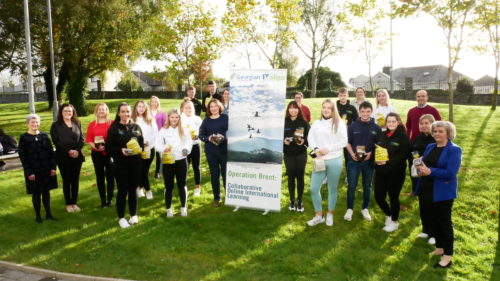
Online English Language Support Programme
The aim of this multi-campus project was to provide high quality online English language support that includes live online lectures, online video lessons and tests.
- We provided a programme that fits into the busy student schedule
- Offered the support needed regardless of the students English language level.
- Delivered content and assessment directly to the student in bite size chunks that fits into their daily routine
- And allowed students to improve their English ‘on the go’ – using their ipad, android, phone, or laptop to access content at any time
Feedback from students demonstrates the effectiveness of the programme
It gives them the confidence to go forward with their academic programme by virtue of improved use of English.
They are supported through an innovative delivery system directly to them and have enhanced learning through state of the art software and course design which brings English language content to them.
It is this learning ‘on the go’ which ensures they can ‘fit in’ English language support around their academic schedule and home life
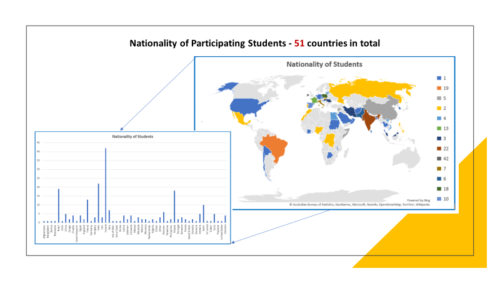
UDL Conference
This CUA Universal Design for Learning (UDL) conference investigated a myriad of approaches to UDL through an exploration of shared best inclusive practice. Through creating an awareness of a cross-campus approach to implementing a culture of inclusion and diversity, the Institute of Technology Sligo has made significant strides in climbing the UDL ladder to bring this vision to reality.
CUA Re-imagining Assessment National Forum Funded Project
The COVID19 pandemic has had a significant impact on all HEIs, not least on processes of learning, teaching and assessment. Unprecedented changes to assessment have had to be introduced, such as open book examinations, remotely proctored exams, 100% continuous assessment and processes to replicate practical and face-to-face assessments in the virtual space. It is timely to take stock of the assessment practices on the ground and to plan for the future post-pandemic learning environment.
Atlantic TU teaching office is involved in support of the academic community to build capacity to design curriculum and teaching practices to ensure a positive student learning experience, maintain robust academic standards, and support student success.
WP 1 – Project co-ordination
WP 2 – Assessment review and development of assessment strategies
WP 3 – Dissemination and exploitation
In the process of development of its submission for designation as a Technological University, the CUA has outlined two sets of relevant principles: those related to learning, teaching and assessment [LTA] and those related to the broader issue of student success.
The CUA has identified nine LTA principles, that include the LTA experience; student-centred learning; centrality of LTA to mission; student success; collaboration; attention to resources and structures; research-informed, access and inclusion and quality assurance.
The CUA LTA principles are specifically aligned with the National Forum strategic priorities (2109-2021) – professional development of those who teach; LTA in the digital world; LTA enhancement across disciplines; and student success.
In its draft submission the CUA identifies that ‘the Technological University is committed to a strategic approach to Student Success, with an evidence-based approach to bring about change and development’. It also identifies that: ‘at the centre of student success lies the student and their learning process’.
This project will support these strategic objectives for LTA and student success across the CUA. In particular it will provide an evidence-based that can inform the development of policies, procedures and practices in relation to assessment.
This initiative will:
- provide an opportunity to assess the impact of the COVID19 pandemic on assessment practices
- provide an overview of the current range and diversity of assessment practices across the Connacht Ulster Alliance [CUA]
- provide the staff within a number of selected discipline/programme groups the opportunity to work intensively on assessment practice, thus supporting disciplinary and trans-disciplinary conversations
- allow selected staff groups to work intensively with Teaching and Learning Offices within and across the CUA
- provide staff with the opportunity to learn about effective assessment practices, both from within the CUA and from the global HE community
- dissemination activities will ensure that learning and achievements within selected groups will be shared with the full CUA LTA community
- the project will be fully documented, thereby creating a permanent resource that will be available into the future
- the learning from the project will inform future pedagogic development through programme reviews and amendments
- Niamh Plunkett
- Gavin Clinch
- Susan McDonnell – Programme Chair
- Maire Hanniffy – Lecturer
- Oliver Lynch – Student Rep.
- Emma McDonald – Research Assistant (3 Institutes)
Graphic Facilitation Digital Badge Project
Motivations for doing the course were focused on engaging and supporting students as can be seen in the comments below:
- “I’m an admin member of staff looking to work more in supporting academic staff in online delivery so want to add this type of courses skill set as step towards this.”
- “Interested in improving how I engage students in module content.”
- “A new and interesting way to deliver/summarise material to/for students. A better way to engage students/get my message across to them.”
- “Be able to illustrate content and complex topics, create overviews of concepts visually.”
- “One module I have in mind is Anatomy & Physiology – some students have no Biology background and really struggle with the material. If I can find a way to simplify things that would be the main aim!”
- “Improved skills, better ways to communicate as we all work from home and ways broaden my experience across other roles.”
- “I have awareness that some students are visual learners and I want to improve my modules to suit them.”
The course was delivered for 10 weeks on Tuesday evenings starting on Tuesday 2nd March between 6pm and 8pm through a live weekly 2-hour session which included live in class drawings.
Each week participants were provided with an E-tivity to prepare for the class. They were then introduced to a new skill which was demonstrated in class and they were invited to practice together.
Topics covered drawing basic shapes, people, environments, objects, developing poster templates, customer / learning journeys, visual CV, Business Snapshots, mind mapping, visual agenda, structuring content, storytelling, thinking in metaphors, live drawing.
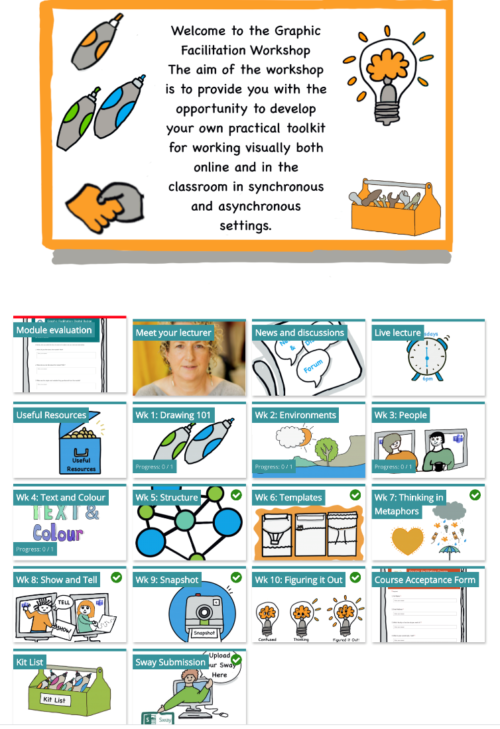
The project was developed to benefit lecturers and PMSS staff in using principles of UDL with their teaching methodologies through principle of representation in order to a support ATU Sligo students. The focus was on both on campus and online students, however due to the current restrictions the module was delivered in a fully online format.
A presentation was delivered by Dr. Tamsin Cavaliero through the CELT series of information sessions on Thursday 18th February titled Graphic Facilitation to Support Student learning.
For more information on Graphic Facilitation Digital Badge Project, visit the Moodle page.
National Forum - UDL Project 2021-2022 - Conceptualising UDL with the Student Voice
Project Lead – Maureen Haran (Lecturer)
Team Members:
Dr. Shelley Brady, Disability Officer
Dr. Ellen McCabe, Instructional Designer
Dr. Niamh Plunkett, Head of Teaching & Learning
Using Electronic Notebooks
Using electronic notebooks to enhance laboratory practical sessions, enquiry-based learning and project supervision in the School of Science.
To find out more, visit Moodle page.
To access all the above projects, video recordings, etc. please go to our “Projects & Research” Moodle page.
